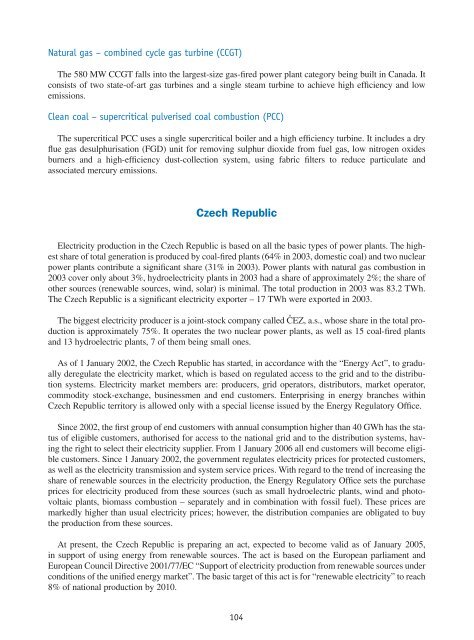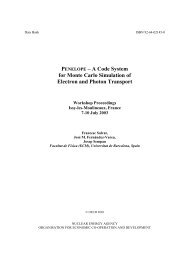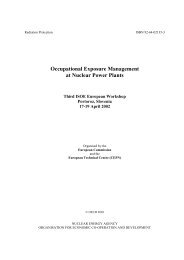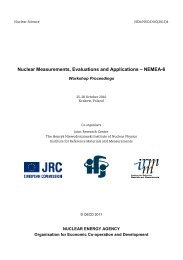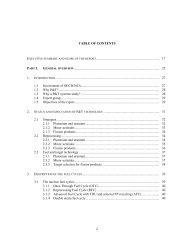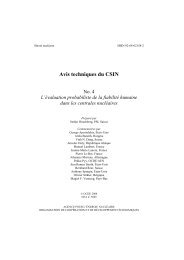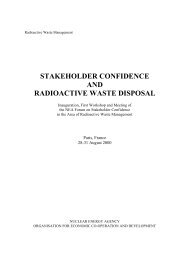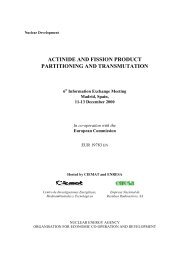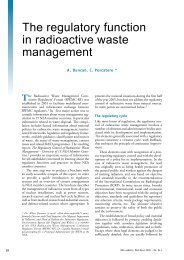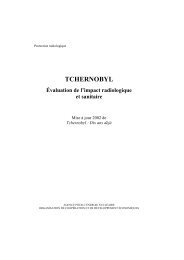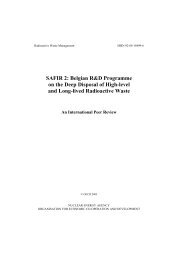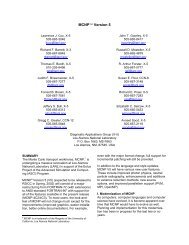Projected Costs of Generating Electricity - OECD Nuclear Energy ...
Projected Costs of Generating Electricity - OECD Nuclear Energy ...
Projected Costs of Generating Electricity - OECD Nuclear Energy ...
Create successful ePaper yourself
Turn your PDF publications into a flip-book with our unique Google optimized e-Paper software.
Natural gas – combined cycle gas turbine (CCGT)<br />
The 580 MW CCGT falls into the largest-size gas-fired power plant category being built in Canada. It<br />
consists <strong>of</strong> two state-<strong>of</strong>-art gas turbines and a single steam turbine to achieve high efficiency and low<br />
emissions.<br />
Clean coal – supercritical pulverised coal combustion (PCC)<br />
The supercritical PCC uses a single supercritical boiler and a high efficiency turbine. It includes a dry<br />
flue gas desulphurisation (FGD) unit for removing sulphur dioxide from fuel gas, low nitrogen oxides<br />
burners and a high-efficiency dust-collection system, using fabric filters to reduce particulate and<br />
associated mercury emissions.<br />
Czech Republic<br />
<strong>Electricity</strong> production in the Czech Republic is based on all the basic types <strong>of</strong> power plants. The highest<br />
share <strong>of</strong> total generation is produced by coal-fired plants (64% in 2003, domestic coal) and two nuclear<br />
power plants contribute a significant share (31% in 2003). Power plants with natural gas combustion in<br />
2003 cover only about 3%, hydroelectricity plants in 2003 had a share <strong>of</strong> approximately 2%; the share <strong>of</strong><br />
other sources (renewable sources, wind, solar) is minimal. The total production in 2003 was 83.2 TWh.<br />
The Czech Republic is a significant electricity exporter – 17 TWh were exported in 2003.<br />
The biggest electricity producer is a joint-stock company called CEZ, a.s., whose share in the total production<br />
is approximately 75%. It operates the two nuclear power plants, as well as 15 coal-fired plants<br />
and 13 hydroelectric plants, 7 <strong>of</strong> them being small ones.<br />
As <strong>of</strong> 1 January 2002, the Czech Republic has started, in accordance with the “<strong>Energy</strong> Act”, to gradually<br />
deregulate the electricity market, which is based on regulated access to the grid and to the distribution<br />
systems. <strong>Electricity</strong> market members are: producers, grid operators, distributors, market operator,<br />
commodity stock-exchange, businessmen and end customers. Enterprising in energy branches within<br />
Czech Republic territory is allowed only with a special license issued by the <strong>Energy</strong> Regulatory Office.<br />
Since 2002, the first group <strong>of</strong> end customers with annual consumption higher than 40 GWh has the status<br />
<strong>of</strong> eligible customers, authorised for access to the national grid and to the distribution systems, having<br />
the right to select their electricity supplier. From 1 January 2006 all end customers will become eligible<br />
customers. Since 1 January 2002, the government regulates electricity prices for protected customers,<br />
as well as the electricity transmission and system service prices. With regard to the trend <strong>of</strong> increasing the<br />
share <strong>of</strong> renewable sources in the electricity production, the <strong>Energy</strong> Regulatory Office sets the purchase<br />
prices for electricity produced from these sources (such as small hydroelectric plants, wind and photovoltaic<br />
plants, biomass combustion – separately and in combination with fossil fuel). These prices are<br />
markedly higher than usual electricity prices; however, the distribution companies are obligated to buy<br />
the production from these sources.<br />
At present, the Czech Republic is preparing an act, expected to become valid as <strong>of</strong> January 2005,<br />
in support <strong>of</strong> using energy from renewable sources. The act is based on the European parliament and<br />
European Council Directive 2001/77/EC “Support <strong>of</strong> electricity production from renewable sources under<br />
conditions <strong>of</strong> the unified energy market”. The basic target <strong>of</strong> this act is for “renewable electricity” to reach<br />
8% <strong>of</strong> national production by 2010.<br />
^<br />
104


